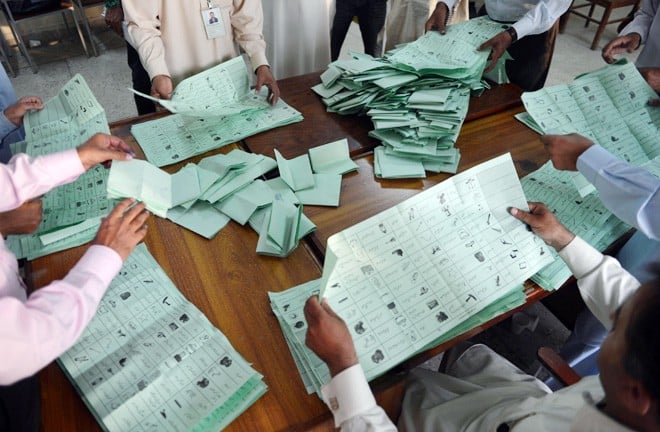
It is believed that the legislative and procedural framework that governs elections in Pakistan offers room for irregularities that create an environment for rigging.
National and international organisations working for electoral reforms in Pakistan or acting as observers, such as Free and Fair Election Network (FAFEN), Pakistan Institute of Legislative Development and Transparency (PILDAT), and the European Union (EU), etc, argue for a set of reforms that will help ensure transparent, fair, and accountable electoral system in Pakistan.
The European Union in its final report on Pakistan’s May 2013 elections said the polls were more free and fair than previous elections. It, nevertheless, warns that non-implementation of certain legal and procedural provisions leaves future elections vulnerable to rigging.
The EU observer mission came up with 50 recommendations for electoral reforms in Pakistan. The EU also noted that by-elections are an opportunity for implementing improved practices.
A few of the proposals from these organisations are listed below:
- The Election Commission should exercise control, superintendence, and discipline on the staff assigned to Election Commission for election duty and training of the polling staff.
- The ECP should improve training of Returning Officers and polling staff.
- The ECP should develop and implement a mechanism to monitor and regulate spending by the political parties during election campaigns.
- The number of polling stations should be increased and they should be made permanent.
- Independence of polling staff should be ensured by the ECP.
- Positive Voter Identification using thumb impression before casting of vote should be ensured.
- Post polling-station wise statement of count should be put on the ECP website as soon as it is received in the ECP.
- Electronic Voting Machines (EVMs) be employed.
- Election tribunals should decide petitions within the 4-months period prescribed in the law.
- Returning Officers should be appointed other than from the Judiciary
- The ECP should allow public access to electoral records and allow for public consultation in decision-making processes and issue regular reports to the parliament.
- Any decision made by the ECP or any of its designated official should not be subject to judicial review after the announcement of the election schedule and until the announcement of the official election results to minimise the judicial interference and subsequent delays in the electoral process.
- After consulting all relevant stakeholders, it should also immediately prepare a list of permanent polling stations, publish it on its website and then provide reasons in writing for any subsequent changes.
- The ECP should consult parties on the amended code of conduct and incorporate their recommendations; otherwise, parliament should rationalise the code.
- The ECP should install an effective results-management system to compile results expeditiously and transparently.
- To prevent disenfranchisement of women, the ECP should monitor electoral turnout and results at both female and combined polling stations and impose penalties on those who prevent women from voting.
- To ensure timely disposition of election petitions, parliament should pass the draft bill to create commissions in each district to vet petitions and send them directly to election tribunals for adjudication instead of through the ECP.
- The ECP should extend the period of scrutiny of candidates’ nomination papers.
- The legal framework for media be revised so that it fully supports editorial independence and eliminates opportunities for censorship.

